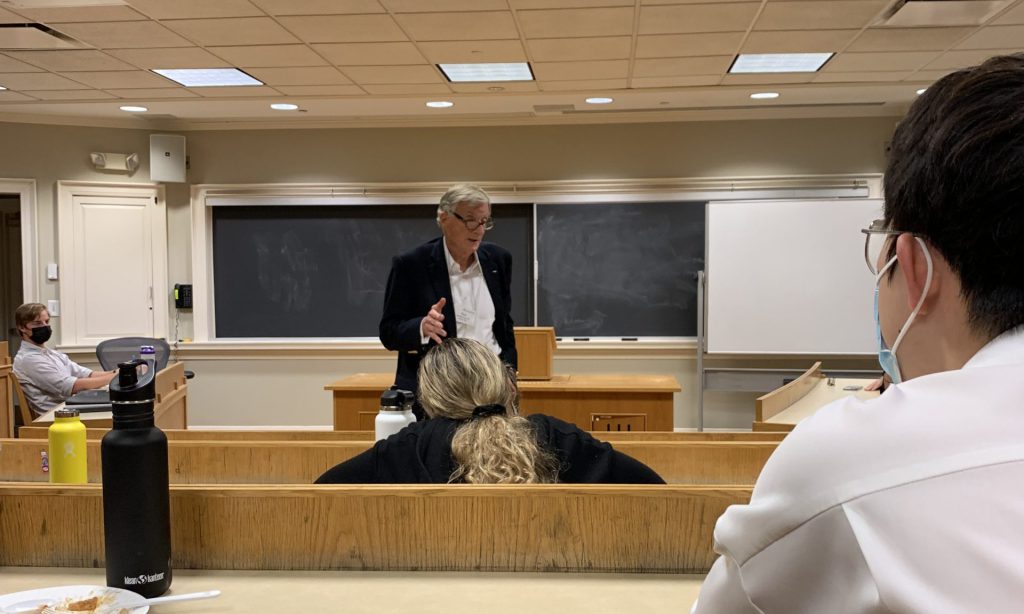promoting... alliances, working with chief executives to assemble teams from diverse sources to create new business opportunities."
– Reuters
September 2021
Remarks by Ted McPherson to the Williams College Entrepreneurship Club
Excerpts from remarks by Ted McPherson ’67, Chief Executive Officer, InterSolve Group, Inc. to the Williams College Entrepreneurship Club Williamstown, Massachusetts, September 16, 2021
“Successful entrepreneurs create value for customers through innovative compelling propositions.
- For example, prior to InterSolve Group, Boards of Directors and corporate executives would purchase services from a large consulting or accounting firm from a partner acting in the role of a salesperson, primarily interested in generating several million dollars of fees annually simply to justify his or her existence. Project staff consisting of junior folks otherwise not billable would conduct a study. The invoice would be determined by hours spent, misguidedly extending the time to complete a project. A second engagement for implementation would be required, elevating the risk and cost for a successful outcome.
- Here’s what is different about InterSolve Group. I take ownership for the result, saying “I will get that done.” My teams consist of the best available talent disproportionate to the task drawn from whatever source “on demand”, thus reducing risk and increasing speed for customized results. Compensation can be fixed-fees, performance-based, equity, or a combination.
- My compelling proposition is conducting business in scale, without size, using the best talent available for difficult assignments, achieving a higher return on human capital with lower risk, better speed, and no residue of structural overhead.”
“Here are “Ted’s Top Ten Truths” in designing your own entrepreneurial journey:
- Decide how hard you are willing to work, while assuring a balanced life.
- Ask yourself, is your goal primarily to be rich, or do you simply have the need not to be poor?
- Differentiate among performance and pay for performance.
- Often there is more risk in not being bold enough than in being too bold.
- Use capital as a scalpel, not a bulldozer. The brains, wits, and creativity of an outstanding, closely-knit, unified team will beat capital spending every time. Ross Perot, Sr.
- If choosing partners to accompany you, be certain to determine if their personal agenda aligns with yours.
- Retain ownership through equity, and control through voting rights for as long as you can.
- Your ability for strategic, conceptual selling of intangibles, and understanding personal wins for buyers and investors is vital for any start-up, along with all communicating skills.
- Acquire financial literacy so you are comfortable reading a balance sheet, income statement, cash flow, and understand asset allocation and equity and fixed income investing.
- Most important, remember people are the only source of a sustainable competitive advantage.”
“Since I am wired “to believe in possibilities”, it is valuable to understand “what’s possible”, as demonstrated by the successes of my “Big-Time Entrepreneur Clients” in both services and products.
- My first client Ross Perot invented outsourcing computing operations and software as a service 60 years ago, when he left IBM after achieving his entire IBM hardware sales goal in the first 30 days of the fiscal year to start EDS in Dallas. Ross sold EDS 22 years later to General Motors for $2.5 billion.
- Eli Broad, through his start-up in 1989 Broad, Inc., changed consumer retirement financial security from mortality-based life insurance to investment savings products. Eli sold Broad, Inc. to AIG for $18 billion nine years later, earning Eli $2.2 billion. Then with a net worth of $7 billion, he donated $4 billion to medical research, public education, and the arts, such as the new Broad Museum in Los Angeles containing Eli’s personal collection of modern art, including 34 Liechtenstein paintings. One painting was the largest charge ever on an American Express card of $2.5 million, earning Eli sufficient travel points for 50 free first-class, round-trip airline flights between his homes in Los Angeles and New York.
- By listening carefully to customers’ future needs, Richard Jaffe, my client in San Diego, sold his first start-up, Guido’s Italian Ices and frozen juice bars (considered more healthy than frozen soft drinks by secondary school officials), to Coca Cola in 1985 for $50 million. In 2000 Richard sold Safeskin Corporation, his second innovative start-up, that manufactured annually 6 billion hypoallergenic powder-free latex medical exam gloves to Kimberly-Clark for $850 million.
You can create value through entrepreneurship in other than commercial enterprises, such as public service or non-profits. George Barnard Shaw, the British playwright said, “All great innovation starts with an unreasonable person.” Entrepreneurs are naturally unreasonable, acting as “owners” regardless of the setting.
- Consider it unreasonable that I, an American Civilization major, would be awarded the National Aeronautics and Space Administration’s (NASA) Exceptional Public Service Medal, in 2009 after serving on NASA’s Advisory Council for four years with America’s leading world-class scientists and astronauts.
- ----The sole criteria for participating in the Advisory Council’s three-day sessions every ninety days was, “You must have earned the right to advise the Administrator of NASA.” Those who didn’t continuously earn that right were immediately dismissed ---- a great ground rule for your own boards and advisors.
- Walter Isaacson wrote, “Steve Jobs of Apple and Edwin Land of Polaroid valued those who stand at the intersection of liberal arts and technology.”

